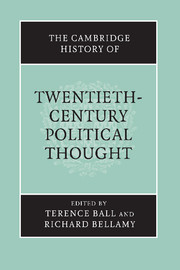Book contents
- Frontmatter
- Editors’ introduction
- Part I The changing fortunes of liberal democracy
- Part II Varieties of Marxism
- Part III Science, modernism and politics
- Part IV New social movements and the politics of difference
- Part V Beyond Western political thought
- 26 Non-Western political thought
- 27 Islamic political thought
- 28 Epilogue: The grand dichotomy of the twentieth century
- Biographies
- Bibliography
- Subject index
- Name index
- References
28 - Epilogue: The grand dichotomy of the twentieth century
from Part V - Beyond Western political thought
Published online by Cambridge University Press: 28 March 2008
- Frontmatter
- Editors’ introduction
- Part I The changing fortunes of liberal democracy
- Part II Varieties of Marxism
- Part III Science, modernism and politics
- Part IV New social movements and the politics of difference
- Part V Beyond Western political thought
- 26 Non-Western political thought
- 27 Islamic political thought
- 28 Epilogue: The grand dichotomy of the twentieth century
- Biographies
- Bibliography
- Subject index
- Name index
- References
Summary
At the end of this century it has for the first time become possible to see what a world may be like in which the past, including the past in the present, has lost its role, in which the old maps and charts which guided human beings, singly and collectively, through life no longer represent the landscape through which we move, the sea on which we sail.
(Hobsbawm 1994, p. 16)In this concluding chapter I ask what story can be told about the overall framework of political thought across the twentieth century. I shall explore Hobsbawm’s suggestion, cited in the epigraph above, by applying it to politics and asking how political issues and conflicts over them were thought about in the course of the century. In particular, I shall focus on the idea, or metaphor, of political space as divided between left and right, examine its formal features, trace its history over the span of the last century and ask whether, and if so when and why, the old left–right maps and charts have lost their applicability.
A preliminary word should be said about Hobsbawm’s cartographic analogy. ‘Maps and charts’ do not, of course, relate to our singular and collective lives as geographical maps and nautical charts relate to landscapes and seas. They enter and partly shape such lives.We live and act by them: they partly constitute what they map and chart. Furthermore, ‘left’ and ‘right’ are classifications that are both cognitive and symbolic: they promise understanding by interpreting and simplifying the complexities of political life and they stimulate emotions, awaken collective memories and induce loyalties and enmities.
- Type
- Chapter
- Information
- The Cambridge History of Twentieth-Century Political Thought , pp. 602 - 626Publisher: Cambridge University PressPrint publication year: 2003
References
- 31
- Cited by



